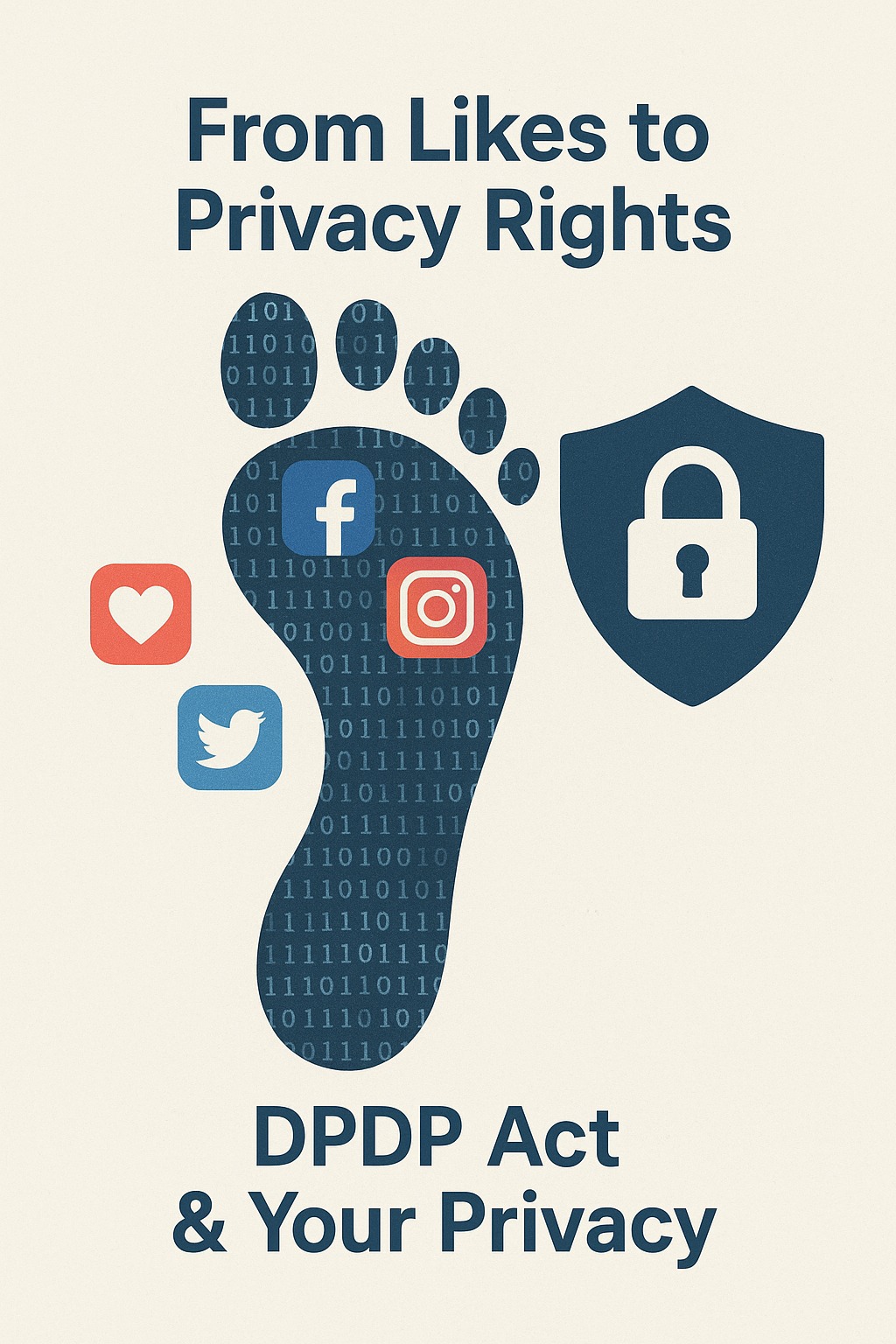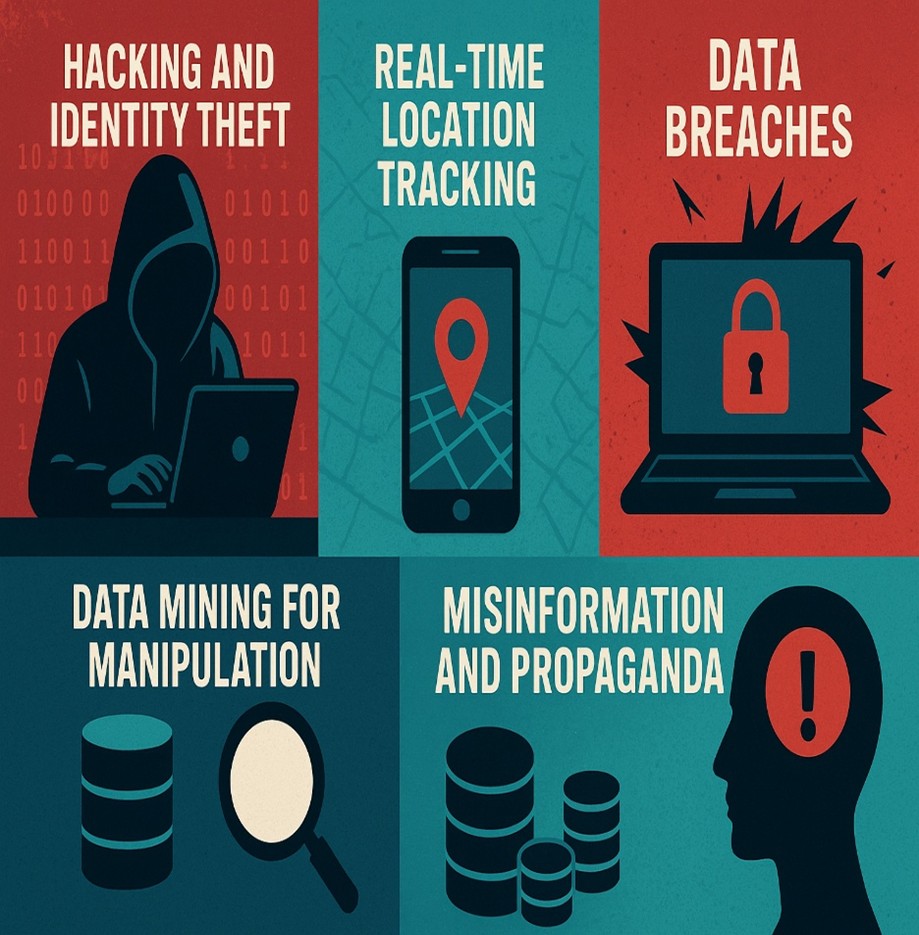From Likes to Privacy Rights: How does the DPDP Act Protect Your Social Media Footprint
By Aparna Mitra, 12th Aug 2025

Imagining a life without the influence of social media is next to impossible these days. It is not just a source of entertainment anymore but has become a source of income, a source of information, a platform to connect to people. From Orkut to Instagram, the Gen-Z has witnessed the true evolution of these social media platforms. How else would I reconnect with a friend I last met 12 years ago? Naturally, it would be difficult to even recognize her face now, this is precisely where data steps in. We have been feeding data to these social media platforms for years now, the social media platforms nowadays have a vast range of user data such as personal information, behavioural data, device and technical data, location data and third-party data but have you ever wondered if such data can be used against us? Let me walk you through the cons of putting your data out there:

Need for Social Media Privacy
Understanding the concept social media privacy concerns is the first step towards resolving the issue. However, individuals who genuinely wish to safeguard themselves while remaining connected online should understand what type of data is most relevant to their worries. This allows them to make more calculated decision about how to use these networks and what information to give. In certain circumstances, data is exchanged unintentionally, only by the use of these networks. For example, tracking cookies on these sites monitor a user's online activity, such as which websites they visit, what they share on their accounts, and what they buy online. This type of data is especially beneficial for advertisers, who can then construct personalised advertising segments to target specific people. However, other information such as employment history, religious affiliation, contact details, media, personal update or current location of an individual, though essential to curate personalised social media experiences such as targeted ads might help third parties including hackers to misuse such information. Social media privacy has a direct impact on consumertrust. Users are more likely to interact with brands that value their privacy and are open about how their information is utilised. Without trust, customers may stop interacting, turn to competitors, or even criticise the company.

Examples of Social Media Privacy Issues
Since the inception of social media, numerous social media data privacy issues have highlighted the risks of social media platforms and the sensitive data they collect. After the introduction of AI, one of the major issues that surfaced was the use of AI for creating deep fakes. A deep fake is basically an image or recording that has been convincingly altered and manipulated to misrepresent someone as doing or saying something that was not actually done or said. Social media turned out to be one of the most vulnerable platforms when deep fakes came into picture, as the circulation is easier and the range of circulation of data is also vast.
Every Click Counts and the DPDP Act Keeps it Safe
Personal data protection has become paramount with the booming digitalization of every sector of everyday life and services, including e-commerce, social networks, hospitality, medicine, and financial services. The Digital Personal Data Protection Act (DPDP Act), India's landmark legislature, intended to safeguard digital personal data of the individual while balancing the needs of data processors. India became the 137th country to adopt the data privacy and data protection law and it draws its inspiration from European Union’s General Data Protection Regulation (GDPR). Right to Privacy was recognised as a Fundamental Right under Article 21 of the Indian Constitution in the year 2018 after the landmark judgement of Justice K.S Puttaswamy v. Union of India. After taking a look at the above-mentioned issues regarding Social media data privacy supported by the real-world examples, we have understood that there is a need to protect our personal data in the digital domain. Let us understand how DPDP Acts help protect our data and what is the need of it.
Why do we need DPDP Act?
In India, the absence of a comprehensive, cross-sectoral data protection law had long created an environment exposed to widespread misuse, breaches, and unauthorized exploitation of personal data amid the country’s rapidly expanding digital economy. Without such a framework, unchecked data collection risked infringing upon individual autonomy, amplifying inequality through biased algorithms, and exposing sensitive information to cybercriminals. The Draft Rules, published in early 2025 to operationalize the Act, further reinforce these safeguards by specifying detailed provisions on compliance, enforcement, and accountability. Collectively, these measures are crucial to upholding the constitutional right to privacy and ensuring robust protection of citizen’s personal data in the digital age. The Act is essential in order to:
· Uphold the Right to Privacy: As discussed previously, the Supreme Court recognized the right to privacy as a fundamental right under Article 21 of the Constitution. The DPDP Act, accordingly, creates a legal framework to enforce this right in the digital sphere and provides remedies in case of violation of privacy.
· Build trust in the Digital Economy: As life gets increasingly digitized, from banking and health care to social media, an astronomically larger amount of our personal data is being processed. Without a strong data protection law, this data is prone to misuse. The DPDP Act makes it a trust-based framework by holding organizations to be transparent and accountable so as to encourage us to confidently use digital services.
· Bring in Parity with World Standards: The DPDP Act puts India on the world map from the perspective of data protection, bringing Indian standards in sync with global standards, such as the European Union's GDPR. This becomes really important in ensuring India's digital economy's participation in international trade and data transfers, thereby presenting a consistent and predictable legal environment.
How does the DPDP Act protect our data?
The DPDP Act empowers individuals (or Data Principals) by imposing stringent obligations on data handlers (or Data Fiduciaries), such as companies or government bodies. The act promotes a privacy-by-design approach, where data security is embedded at each and every stage of processing. Prominent among these are:
· Consent and Purpose Limitation: Data can be collected or processed only by explicit, informed consent of the individual who is or may be affected, or for "legitimate uses" specified in the Law without consent This provision thus seeks to free data subjects from arbitrary, unregulated or indiscriminate use and harvesting of their data and
prevent the collection of data needlessly or for other purposes than those set out in advance. The Draft Rules add further detail about consent management wherein fiduciaries are required to provide a mechanism to verify that consent was given, and to allow for withdrawal thereof, as well as special measures for the protection of children's data, including parental verification.
· Data Minimization and Accuracy: Fiduciaries must limit data collection to what is essential and make sure it is accurate. This principle has the potential to mitigate a vulnerability so very viewably by reducing the "attack surface" for the team of hackers.
· Reasonable Security Safeguards: The Act requires fiduciaries to implement adequate technical and organizational measures to prevent unlawful data access, alteration, disclosure, or processing. The Draft Rules mandate “reasonable security safeguards” proportionate to the volume, sensitivity, and potential harm to data subjects, including measures like encryption, access controls, and periodic audits.
· Rights of Data Principals: Data Principals get enforceable rights to access, correct, erase, or port their data, and can also nominate a person to exercise these rights on his/her behalf in case he/she is incapacitated. This grants them some power to control their information and its misuse for long-term purposes.
In addition to these provisions, the DPDP Act provides for the protection of personal data, with punishment that may extend to INR 250 Crores to deter negligence. The Draft Rules beef up the framework by putting in clarification and details as to how the Rules are to be implemented, such as guidelines for cross-border transfers of data and redressal of grievances.

From Clicks to Clarity
In today’s hyperconnected world, every tap, swipe, and scroll leaves behind a digital footprint that can either empower or endanger us. The DPDP Act is not merely a legal safeguard but a statement of intent, an affirmation that our privacy is not a privilege but a right. As social media continues to evolve and the boundaries between personal and public spaces blur, this law stands as a crucial shield, ensuring accountability, transparency, and trust in the digital ecosystem. By understanding our vulnerabilities and the protections available to us, we, as users, can transform from passive data providers into informed digital citizens making every click not just safer, but smarter






